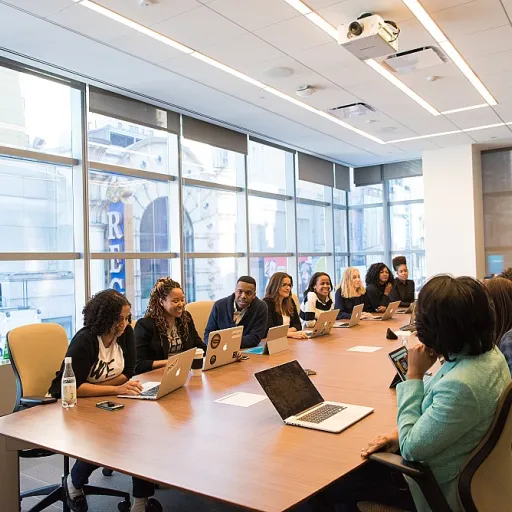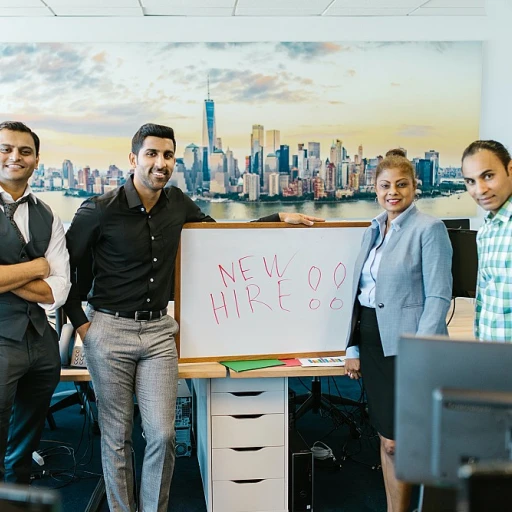
Understanding the Importance of Diversity in Hiring
The Role of Diversity and Inclusion in the Hiring Process
The importance of diversity and inclusion in the hiring process cannot be overstated. These elements not only enrich the workplace culture but also drive innovation and business success. When organizations prioritize diversity, equity, and inclusion (DEI), they create more inclusive environments that attract a diverse range of talent. A diverse work environment fosters creativity and allows organizations to benefit from a wide range of perspectives. By encouraging diversity in hiring, companies can ensure they are using the best approaches to make decisions and solve problems, which enhances productivity and engagement. Furthermore, it promotes an inclusive workplace where team members feel valued and respected for their unique differences, whether it's background, sexual orientation, or any other aspect of their identity. Incorporating DEI-focused strategies in the hiring process is more important than ever in today's global landscape. Crafting effective diversity interview questions is an essential part of this strategy. Effective questions help to surface how potential candidates have engaged with diversity and inclusion in their past roles and signals to candidates that the organization is committed to these values. Understanding why diversity matters in hiring goes beyond just filling quotas or meeting legal obligations; it's about forging real connections and fostering an inclusive environment. For a deeper understanding of incorporating diversity into problem-solving and team dynamics, check out how this approach benefits engagement in other contexts, such as engaging high school students with effective problem-solving activities: relevant SEO anchor.Key Elements of Effective Diversity Interview Questions
Crafting Questions That Promote Equity and Inclusion
When developing diversity interview questions, it's crucial to ensure they are designed to promote equity and inclusion. This involves understanding the diverse backgrounds and experiences of potential candidates and crafting questions that allow them to express their unique perspectives. The goal is to create an inclusive environment where all candidates feel valued and respected.
Focusing on Open-Ended Questions
Open-ended questions are a key element in effective diversity interviews. These questions encourage candidates to share their experiences and thoughts in detail, providing insights into their understanding of diversity and inclusion. For example, asking a candidate to describe a time they worked in a diverse team can reveal their approach to collaboration and inclusion.
Aligning Questions with Organizational Values
Questions should align with the organization's values and commitment to diversity, equity, and inclusion (DEI). This alignment helps in assessing whether a candidate's values resonate with those of the company. For instance, questions about how a candidate has previously contributed to an inclusive workplace can indicate their potential impact on your work environment.
Ensuring Relevance and Fairness
It's important to ensure that the questions are relevant to the job role and fair to all candidates. Avoid questions that may inadvertently disadvantage certain groups. Instead, focus on questions that assess a candidate's ability to contribute to a diverse and inclusive workplace. This approach not only supports equity but also enhances the overall hiring process.
Incorporating Feedback and Continuous Improvement
Regularly reviewing and updating your interview questions based on feedback from candidates and interviewers can help maintain their effectiveness. This continuous improvement process ensures that your questions remain relevant and aligned with the evolving understanding of diversity and inclusion in the workplace. For more insights on refining your approach, consider exploring conflict resolution in team management.
Examples of Diversity Interview Questions
Illustrative Questions and Their Applications
Finding the right diversity interview questions to foster an inclusive workplace can be challenging but pivotal in ensuring diverse hiring. By tailoring questions, you not only assess the candidate's skills but also their alignment with dei values. Here are some examples that can be effectively integrated into your hiring process:- Understanding the Candidate's Experience: Ask the candidate to share an example of how they have contributed to a diverse and inclusive work environment. This can shed light on their past engagement and commitment to diversity and inclusion (DEI) principles.
- Approach to Diverse Teams: Encourage candidates to discuss how they’ve adapted their work style when surrounded by team members from diverse backgrounds. This gauges their flexibility and understanding in collaborative settings.
- Equity and Inclusion Perspectives: Ask how they would promote equity and inclusion in their direct reports or departments. This helps understand their strategies for fostering a more inclusive workplace.
- Judgement in Sensitive Situations: Pose hypothetical scenarios, such as handling a conflict rooted in racial or sexual orientation issues. Effective responses can reveal the candidate's empathy and problem-solving skills.
Avoiding Common Pitfalls in Diversity Interviews
Avoiding Missteps in Diversity Interviews
When conducting diversity interviews, it's crucial to steer clear of common pitfalls that can undermine the goal of creating an inclusive workplace. Here are some key areas to focus on:
- Overgeneralizing Candidates: Avoid making assumptions about a candidate's experiences based on their background. Each individual brings a unique perspective, and it's important to ask questions that allow them to express their personal experiences and views.
- Leading Questions: Craft questions that are open-ended and do not lead the candidate to a specific answer. This approach encourages genuine responses and provides a better understanding of how the candidate might contribute to a diverse and inclusive work environment.
- Ignoring Intersectionality: Recognize that diversity encompasses various dimensions, including race, gender, sexual orientation, and more. Questions should reflect an understanding of how these aspects intersect and influence a candidate's experience and perspective.
- Lack of Consistency: Ensure that all candidates are asked the same core questions to maintain fairness and equity in the hiring process. This consistency helps in evaluating candidates on a level playing field.
- Inadequate Preparation: Interviewers should be well-prepared with a clear understanding of the goals of diversity, equity, and inclusion (DEI) within the organization. Training interviewers to handle diversity-focused interviews effectively is essential for avoiding missteps.
By addressing these common pitfalls, organizations can foster a more inclusive environment that values diverse perspectives and experiences. This not only enhances the hiring process but also contributes to building a more cohesive and effective team.
Training Interviewers for Diversity-Focused Interviews
Preparing Interviewers for Diversity-Centric Conversations
Training interviewers is a crucial step in ensuring that diversity, equity, and inclusion (DEI) principles are effectively integrated into the hiring process. A well-prepared interviewer can create an inclusive environment that encourages candidates to share their experiences and perspectives. Here are some key strategies to consider:- Understanding DEI Concepts: Interviewers should have a solid grasp of diversity, equity, and inclusion concepts. This understanding helps them appreciate the importance of diverse perspectives in the workplace and recognize the value of each candidate's unique background.
- Developing Empathy and Active Listening Skills: Training should emphasize the importance of empathy and active listening. Interviewers need to be open to different viewpoints and ready to engage with candidates in a way that makes them feel heard and respected.
- Crafting Inclusive Questions: Building on the key elements of effective diversity interview questions, interviewers should learn how to craft questions that are open-ended and inclusive. This approach encourages candidates to share their experiences related to diversity and inclusion.
- Avoiding Bias: Training should address common pitfalls in diversity interviews, such as unconscious bias. Interviewers must be aware of their own biases and learn strategies to mitigate them, ensuring a fair and equitable hiring process.
- Role-Playing and Feedback: Incorporating role-playing exercises can be beneficial. Interviewers can practice asking diversity-focused questions and receive feedback on their approach. This practice helps them refine their techniques and become more comfortable with DEI discussions.
Evaluating the Impact of Diversity Interview Questions
Assessing the Effectiveness of Your Interview Strategies
Evaluating the impact of diversity interview questions is critical in ensuring your hiring process truly promotes an inclusive workplace. How can you confirm that your hiring decisions reflect your company's values of diversity, equitably considering each candidate? Here are some strategies to evaluate the effectiveness of your approach:- Track Diversity Metrics: Keep a record of the diversity within your candidates and eventual team hires. Consider aspects such as gender, sexual orientation, and other identities. Increased diversity in new hires could suggest effective diversity interview strategies.
- Solicit Candidate Feedback: After interviews, request feedback from candidates on their experience. Were the interview questions equitable? Did they feel the process encouraged inclusion? This feedback can be insightful for fine-tuning your approach.
- Analyze Hiring Patterns: Compare past and present hiring patterns. Increased diversity among team members and direct reports may be a strong indicator of how inclusive your process has become.
- Conduct Inclusion Surveys: Regularly gather input from your work environment through employee surveys. Understanding team members' perspectives on diversity and inclusion can inform whether the interview questions are effectively cultivating a diverse inclusive culture.
- Review with an Outside Perspective: Sometimes, an external review offers an unbiased view of your current practices. DEI experts can help in assessing if the right questions are asked during interviews and offer improvement recommendations.













